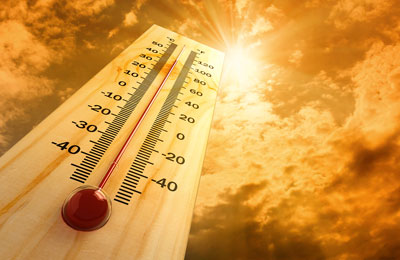
Summer heat, rain on rise as weather gets trapped
Oslo, August 12, 2014
Summer heatwaves and downpours have become more frequent in the northern hemisphere this century, apparently because extreme weather can get trapped for weeks in the same place in a warming world, a study showed.
Disruptions to the jet stream, which forms huge meandering waves as it blows at high altitude around the planet, and cold air from a thaw of Arctic ice may explain why weather systems are stalling more often, the scientists wrote.
"Weather extremes in the summer - such as a record heatwave in the United States that hit corn farmers and worsened wildfires in 2012 - have reached an exceptional number in the last 10 years," the Potsdam Institute for Climate Impact Research said of its findings.
Other long-lasting extremes include a 2010 heatwave in Russia and floods in Pakistan, a 2003 heatwave in Europe and rains that caused flooding of the Elbe and Danube Rivers in Europe in 2002, it said.
"We are warming our atmosphere by emitting carbon dioxide from fossil fuels, but the increase in devastating heatwaves in regions like Europe or the U.S. seems disproportionate," lead author Dim Coumou said in a statement.
Climate change was disrupting the flow of the jet stream, which blows from west to east around the Earth and forms waves high in the atmosphere that can be thousands of km (miles) from crest to crest.
"In periods with extreme weather, some of these waves become virtually stalled and greatly amplified," it said. "While a few days have little impact, effects on people and ecosystems can be severe when these periods are prolonged."
Writing in the U.S. journal Proceedings of the National Academy of Sciences, the study listed seven examples of extremes since 2000 against three in the 1990s and four in the 1980s.
"In the summer of 2010 the Russian heatwave was centred over Moscow, downstream there was Arctic air going southwards all the way towards Pakistan," Coumou told Reuters.
Figuring out how far such extremes are simply freak natural events or linked to man-made climate change has big implications for governments which have promised to agree a U.N. deal by the end of 2015 to combat climate change.
Monday's study looked only at summer weather extremes. Other studies have suggested that a melt of the Arctic, natural variation or changes in the Pacific Ocean may have caused recent winter cold snaps like the one in the United States this year.
The U.N. panel of climate scientists says it is at least 95 percent likely that human activity, led by the burning of fossil fuels, is the main cause of recent warming. Opinion polls show that many voters believe that natural variations are to blame. – Reuters







